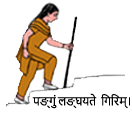Yoga
Regular Yoga practice
Studies for Diploma in Yoga (Yoga Vidyapeeth, Nashik) – 2 Examinations passed with distinction
Special interest in Yoga for arthritis and other rheumatologic diseases
Publications:
- Yoga for Rheumatic Conditions
- Yoga for Arthritis
- Yoga for voice culture
- Yoga for Back Pain
Sanskrit
- M.A. (2020) – Gold Medalist (Tilak Maharashtra University): CGPA 8.38 (Outstanding) Special subjects: Literature
- B.A. (2018) (Tilak Maharashtra University): CGPA 8.52 (Outstanding) Special subjects: Literature
- Sanskrit-Kovid (2015) (Tilak Maharashtra University): 81% marks
- University Scholarship for five years during graduate and postgraduate studies
- Prizes at M.A. examination
- Late Malati S. Dhupkar and Late S.H. Dhupkar prize
- Late Dhondumama Sathe prize
- Smt. Parvatibai Shankar Joshi prize
- Vinaya Deo and Rohini Ketkar prize
- Author of book – Jatakmala (for graduate studies)
- Lecture on: Kalidas in Meghdoot
Music
- Sangeet Alankar (2007) Postgraduate Qualification (Over 90 Ragas and other training)- Akhil Bharatiya Gandharva Mahavidyalaya Mandal, Mumbai (Guru: Pandit Narayan Waman Diwan, Pune – Gwaliar Gharana)
- M. A. (Music) A Grade (GPA 8.42) Bharati Vidyapeeth, Pune, India (2017) (Guru: Pandit Vikas Kashalkar)
- Distinction at Sangeet Visharad Final examination (80% marks)
- Development of a new Raga (Yashnarayan ) and new compositions in light music (Geet-Shree)
New compositions in classical music
Stage performances in Indian classical vocal music
Various prizes in school, college and other competitions including
- Maha-Kavi Kalidas Intercollegiate Music Competition (1974)
- Soor- Sanvardhan Music Competition (1998)
- Late Pandit Jayawantrao Mirajkar Memorial Foundation Music Competition (1999)
- Late Pandit Vasudeorao Kulkarni Award – Saraswati Sangeet Vidyalaya (2003)
- First prize in singing (Marathi) above 55 years group, Indian Medical Association- Maharashtra State competition (2024)
- First prize in singing (Hindi) above 55 years group, Indian Medical Association- Maharashtra State competition (2024)
Publications :
- Music Therapy in Rheumatic Conditions
- Yoga for Voice-culture
- Gwalior Gharana (Booklet in Marathi) – Parampara, Pravah, ani Parivartan
- Pandit Keshavbua Ingale
- Editor of Book – Gana-Narayan, Saraswati Sangeet Vidyalaya Golden Jubilee Memorial Publication
Others:
- Founder Secretary, Geet-Rang (Organization for promotion of Music) – Stage shows with various themes including Marathi Gazal (Rang Vegala) and rare songs of Late Sudhir Phadake (Anokhe Babuji)
- Organization of Intercollegiate Music competition
- Secretary, Saraswati Sangeet Vidyalaya Golden Jubilee Committee
Quick Links
Related Publications
General instructions about exercise
Do exercises in fresh, pleasant environment.
It is better to exercise on empty stomach (morning/evening).
Do not eat anything for about an hour after exercise. Sips of water or other fluids are allowed.
Wear comfortable cotton clothes during exercise.
Use proper footwear during exercise. Use of sports or canvas shoes recommended.
Breathe in and out normally from nose. Avoid mouth-breathing.
Concentrate on your exercise and exercise slowly. Never exercise hastily; do not jerk your joints.
Rest for a minute or so if you feel fatigue.
Concentrate on the joint or muscle group for which you are exercising.
Learn exercises, especially those for shoulder, from a physiotherapist.
One should feel relaxation of muscles after exercise. Increase in pain after exercise may indicate wrong method. Stop exercise and meet your physiotherapist again in such situation.
Be relaxed and maintain proper posture during exercise. It is good to look into a mirror during initial days of exercise.
Maintain a posture for about 10 seconds and return back slowly to resting position.
Start low - for some minutes - and increase your work-out gradually.
Exercise one sided limbs at a time initially. Simultaneous exercise for both limbs will be possible after some days.
Exercise twice each day. Regularity is of utmost importance.
Look for a friend if exercising alone gets boring. Exercise accompanied by music is quite entertaining.
Balanced diet is also necessary appropriate benefits of exercise. Meal timings should be strictly adhered to. Consult a dietitian for reducing weight.
General instructions for yoga practice
Yoga postures should be practiced in a clean and fresh surrounding. Do the asanas on a soft and clean mattress. Use clean, light, loose and minimum clothing.
Do the asanas in morning or evening on empty stomach. Eat light food half an hour after completing practice.
Warm-up, in the form of Soorya-namaskar is desirable prior to asanas.
All movements should be gentle and controlled. Do not jerk your body. Do not over-stretch. Do not use any force to overdo.
Watch your breathing. Breathing should be easy and natural. Exhale while you bend forwards and inhale while bending backwards. Never hold breath.
One should be comfortable in any asana. Do whatever little you can. Do not try to overstretch to attain a pose as given in pictures. Trembling during asana implies overdoing.
Steadiness is of utmost importance. Period of staying in a single pose will increase with practice. Try to contract only those muscles that are required for a particular pose while relaxing all other muscles.
Draw your mind away from your body and concentrate on breathing on attaining desired pose.
Select and practice a few asanas and try to master them.
There should not be any pain, fatigue or sweating during asanas. Do a resting asana if any of these appear. One should feel enthusiastic after a yoga session.
45 minutes of yoga practice each day is desirable. Pranayama may also be done for a few minutes. Regularity is the key to success.




